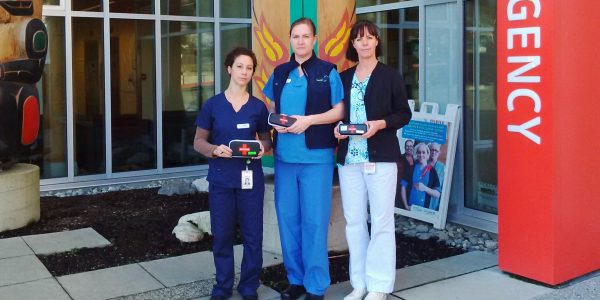Take-home naloxone kits now available in Sechelt and Central Coast hospitals
The emergency departments at Sechelt Hospital, Bella Coola General Hospital and R.W. Large Memorial Hospital in Bella Bella are now equipped with take-home naloxone kits. These sites now mean all 14 VCH emergency departments and urgent care centres have the kits to offer to patients at risk of overdose.
“Staff feel it’s worthwhile,” says Michelle Stanton, manager, acute services, Sechelt Hospital. “If they can help one person, then that would be great. The more we can get it out there and in people’s hands who can use it, the better.”
The challenge some people in the community have with the kits is a fear to use them when needed, says Michelle.
“People who aren’t familiar with the drug or injections are worried they could cause more harm so we’re trying to let people know that you can’t make someone worse by giving them naloxone,” says Michelle. “In fact, if you don’t give it when it’s needed, it could be dire.”
What is Naloxone?
Naloxone, or Narcan, is a medication that reverses the effects of an overdose from opioids (i.e. heroin, methadone, morphine, oxycodone and fentanyl.) Giving naloxone can prevent death or brain damage from lack of oxygen during an opioid overdose. It does not work for non-opioid overdoses such as cocaine, ecstasy, GHB or alcohol.
The addition of EDs in the Take Home Naloxone (THN) Program is in response to the surge in drug-related overdose deaths across the region associated with fentanyl. In April, B.C. declared a public health emergency after another spike in drug-related overdoses and deaths.
Fatal overdoses
According to the BC Coroners Service, from January 1 to November 30, 2016 there were 755 overdose (OD) deaths due to illicit drug use across BC. Fentanyl was detected in 60% of them – 193 of the deaths occurred in the Vancouver Coastal Health region, including 164 in Vancouver, 10 in Richmond, 5 in Powell River and 9 in North Vancouver.
Overdoses in VCH rural areas
In VCH rural hospitals (Bella Coola General Hospital, R.W. Large Memorial Hospital, Sechelt Hospital, and Powell River General Hospital), OD reporting began in June 2016. Since then there have been 21 ODs reported, of which 43% were opioid related. Of these 21 ODs, 8 were admitted, 2 were transferred, 7 were discharged, 1 left against medical advice, 1 resulted in death, and for 1 the outcome was unknown.
There are now 71 non-acute sites throughout VCH where take-home naloxone kits are available for the public. An online map is now available showing sites where people can obtain them, and aren’t required to be registered clients of the particular program.
For a complete list of actions to date and info about overdose prevention such as how to use naloxone and where free take-home kits are available visit www.vch.ca/overdose.

